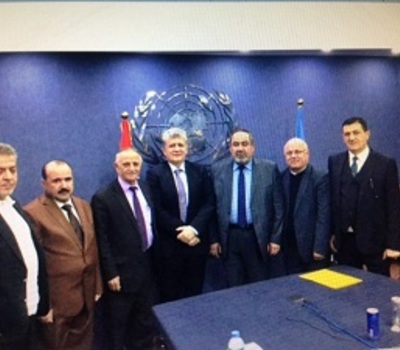
- William Warda presents a presentation to Mr. Miroslav Jenka, UN Assistant Secretary General for Political Affairs on the situation of Iraqi minorities
Mr. William Warda, representative of the alliance of Iraqi Minorities Network and Public Relations Officer of Hammurabi Human Rights Organization meet Mr. Miroslav Jinka, UN Assistant Secretary General for Political Affairs, in his participation in an elite meeting called by the United Nations Mission in Iraq (UNAMI) on 23-January-2018. The meeting was moderated by Mrs. Amira Khudair, responsible of the file of minorities in UNAMI.
The meeting was also attended by deputies of Iraqi Parliament, Yonadam Kanna, Salem Al-Shabaki, Harith Shanshal, Haji Kendour and member of Baghdad Provincial Council Mr. Fuad Ali Akbar.
Mr. Warda , the key speaker of the meeting discussed the situation of Iraqi minorities in general and challenges facing them ,available opportunities according to national political developments and the interaction of tighten and attraction of the Iraqi political process .
Laying national prospects necessary to re-demarcate the relationship of solidarity among all components of Iraq, designating number of indicators, including that the participation of minorities in formulating public policies are still not up to the required level, despite the minorities are of elites and opinion-makers, although they are the original components of the country.
Mr. Warda also referred to the negative phenomenon of discrimination against minorities in both legislations and laws and the failure to implement the constitutional provisions guaranteeing the rights of those components, as some of these texts need enactment and amendment of necessary laws and regulations.
Mr. Warda concentrate over the issue of non-recognition of the rights of minority components to the extent of the Bahai's, as they still have their own legislation to be considered by Mouslims, while they have their own religion. He also made it clear that there was no recognition of ethnic, cultural or linguistic realities of some minorities in the constitution, such as the Shabak, Kakkai or Zoroastrianism.
The representative of the alliance of Iraqi Minorities Network and Public Relations Officer of Hammurabi Human Rights Organization, referred to Iraqi Armenians with no representation in the Parliament at the national level. Mr. Warda referred to the lack of justice in the quota of minority representation in the House of Representatives mentioning that it does not fit their population referring to the situation of Yazidis represented by only one seat in the parliament, while more than half a million people in Iraq.
Mr. Warda also addressed other issues related to the suffering of the Faily Kurds, particularly the issue of re-establishing the dropped Iraqi nationality since the previous regime, and the difficulties of recovering their confiscated property in a timely manner.
He also referred to the concern of minorities and the fear of extremist rhetoric, which is being launched from time to time under various pretexts, posing a threat to their present and future existence.
At the same time, Mr. Warda stressed that the divisions and conflicts existing between minorities and the lack of a shared vision of fateful issues form an obstacle to their movement towards achieving their rights. They also discussed the challenges faced by the minorities in the issue of the return of the displaced people to homelands, under the conflict between Baghdad and Erbil, and imposition of the new reality after the referendum in Kurdistan region of Iraq in September 2017.
Mr. Warda also referred to the positive points and opportunities indicating to some optimism views regarding the reformist vision of the Prime Minister and the broadening of the legal and relief field in the minorities. He stressed that the UN move to support and sustain minorities is based on facing these challenges perpetuating and feeding the civil trends which preserves Iraq's demographic diversity, rejecting all the pitfalls of marginalization, isolation, containment and immediate political gain.

